#한국어능력시험
Explore tagged Tumblr posts
Text
음,, 마이크 테스트.,!
안녕하세요! 오랜만에 인사 드립니다.
글을 자주 못 올려서 죄송합니다.
공부하는 과정을 담고 싶어서 계정을 만들었는데 초반에만 올렸고 그 후엔 잘 안 올려서 여러분들한테, 그리고 제 자신한테 좀 부끄럽습니다.
뭔가 초심을 잃었던 것 같기도 하고요. 그지요?!?
저는 요즘 들어 한국어가 더 이상 공부 과목처럼 느껴지지 않거든요. 이제는 제 일상이 돼요. 제가 보고 듣는 콘텐츠들은 99% 한국 콘텐츠들이어서 매번 노트에 모르는 단어를 적을 시간도 없어요 (귀찮기도....).
계속 이러면 안 될 것 같아서 이번엔 다시 시작해 보려고요...
꾸준히 할 수 있을지 모르겠지만요ㅎㅎ
ㅡㅡㅡㅡ
그리고 이 자리를 빌어,, 좋은 소식 하나 드리겠습니다..
짜짜짜짠~~~

저 한국어능력시험을 6급 받았어요 ㅎㅎㅎ (인스타 친구들에게는 먼저 알려드림, 늦게 전해서 죄송합니다;;;)
이 소식이 여기에 늦게 전하다니.. 서운해하지 마세요,, 네? (›´-`‹ )
저는 5급만 딸 줄 알았거든요? 2년 전에 공부 좀 했는데도 4급만 땄는데 이번에 준비도 잘 안 했는데 감히 6급 딸 생각도 못 했어요...!
기대 아예 안 해서 그런지 생각보다 기뻐요 ㅋㅋ.
그래도 저는요. 6급 땄다고 해도 만족은 아직 못해요. 저 점수만 보면 모두 다 90대까지 올려야겠다는 생각밖에 없어요! 더 열심히 해야겠군.... 싶다.
그래서!
앞으로!
잘 부탁드립니다~~
15 notes
·
View notes
Text
Fuck it, posting my language certifications.
Yeah, they're outdated because of the military coup. No, I ain't lying about my certifications. "Hnin Oo Lwin" is my full name and honestly, there are thousands of people who share my full name so I'm not scared to put it out there. Like I said, Burmese names work different.
Also, I was 19 in 2019.
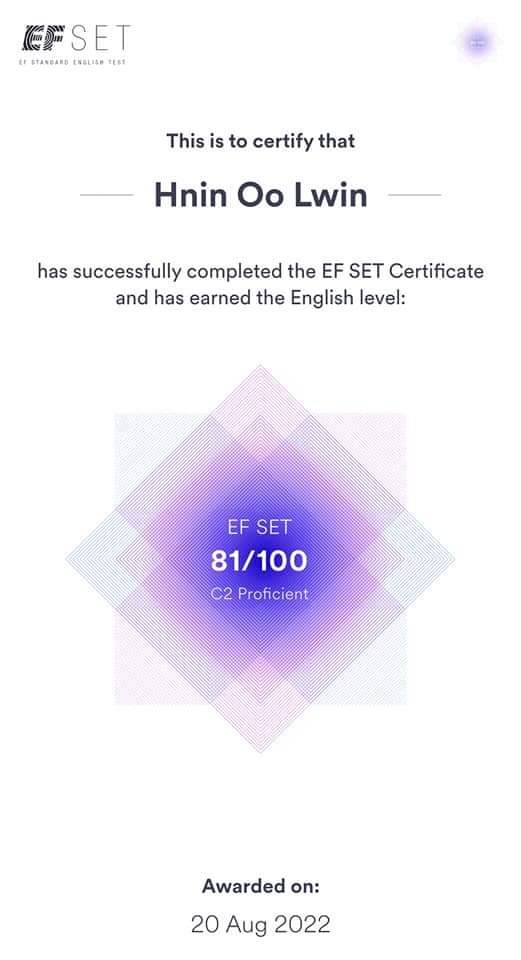


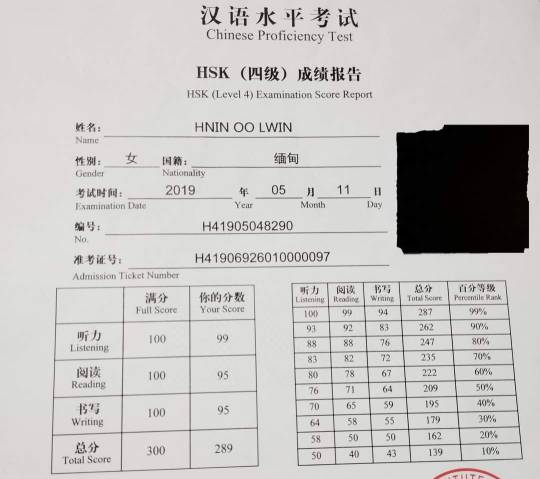
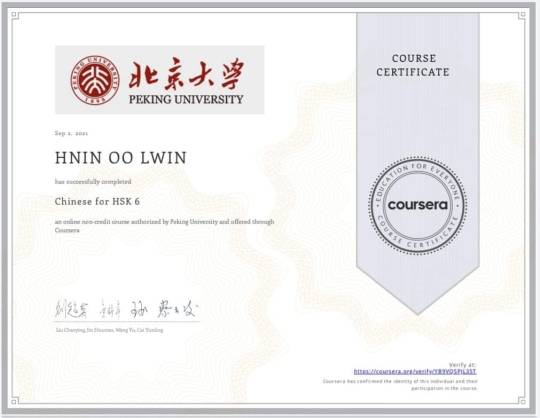
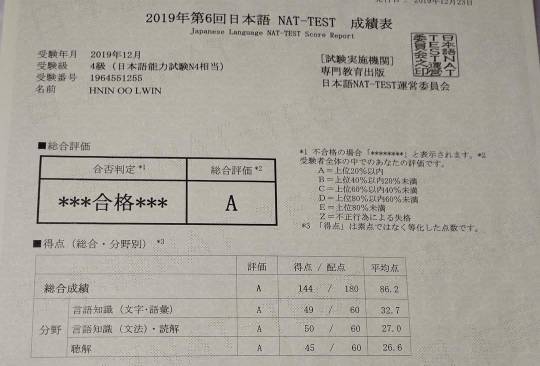
#english language#efset#English C2#TOPIK#topik II#hsk 5#hsk#han yu shui ping kao shi#jlpt#NAT test#chinese studyblr#korean studyblr#japanese studyblr#English translator#토픽#한국어능력시험#studyblr#langblr#汉语水平考试#日本語能力試験#日本語#汉语#华文#한국어#chinese langblr#chinese language#korean language#japanese language#burmese
12 notes
·
View notes
Text





kelly_linwish 1. 오늘 밥 먹다가 찍은 거울셀카 2. 자라 피팅룸에서 찍은 거울 셀카 3. 프로필사진 고르기 비하인드 4. @soeun_earu 한테 ‘나 가을뮤트 아냐‘ 하면서 보낸 셀카 5. 거실에 앉아 있었는데 심심해서 찍은 셀카 6. 6급 받은 한국어능력시험 성적표 (그냥 자랑하고 싶었어 ㅎㅎ헤)
2 notes
·
View notes
Text
list of korean language youtubers you might have not heard of!
they all have about 5-40k of followers, they were a huge help for me.
11 notes
·
View notes
Text
만달레이에서 예정된 제100회 TOPIK 시험 취소... 한국대사관 발표
[애드쇼파르] 2025년 4월 8일 주미얀마 한국대사관은 5월 11일 만달레이 외국어대학교(Mandalay University of Foreign Languages)에서 치러질 예정이었던 제100회 한국어능력시험(TOPIK)을 취소한다고 발표하였다. 대사관은 3월 28일 발생한 만달레이 지진으로 인해 많은 피해가 발생하였고, 이를 계기로 만달레이 주민들에게 깊은 슬픔과 위로를 표한다고 밝혔다. 이어서, 지진의 여파로 지원자들의 안전을 보장하기 어렵다는 판단에 따라 이번 시험 취소라는 불가피한 결정을 내리게 되었다고 설명하였다. 시험 등록비는 원하는 응시자들에게 전액 환불될 예정이며, 환불을 원하지 않는 지원자는 올해 10월 또는 11월에 양곤에서 진행되는 시험에 참가할 수 있는 ��션을 제공하겠다고…
0 notes
Text
0 notes
Text
K패스카드 증명사진 재발급 신청 완벽 가이드 | K패스카드, 재발급, 증명사진, 신청 방법
K패스카드 증명사진 재발급 신청 완벽 설명서 | K패스카드, 재발급, 증명사진, 신청 방법 K패스카드 증명사진을 분실하거나 훼손되어 재발급이 필요하신가요? 걱정하지 마세요! 이 글에서는 K패스카드 증명사진 재발급 신청 절차를 단계별로 자세히 알려제공합니다. 본인 확인 절차부터 필요한 서류, 신청 방법까지, K패스카드 증명사진 재발급을 위한 모든 것을 한눈에 볼 수 있도록 꼼꼼하게 정리했습니다. 이 설명서를 통해 빠르고 쉽게 K패스카드 증명사진을 재발급 받으세요. ✅ K패스카드 증명사진 재발급 신청 방법, 궁금한 점이 있다면 바로 확인하세요! 👉 K패스카드 재발급, 지금 바로 확인! K패스카드 증명사진 재발급 신청, 이렇게 하세요! K패스카드는 한국어능력시험(TOPIK) 응시, 한국어 학습 및 문화 체험…
0 notes
Photo

If you're learning Korean, you might have encountered the word "어차피" (eo-cha-pi) at some point. It's a useful word that can be translated to "anyway," "in any case," or "after all." When you use "어차피," you're often indicating that something is inevitable or necessary, regardless of other circumstances. To use "어차피", you simply need to add it to the sentence. E.g. 어차피 늦었으니까 천천히 와. (It's late anyway, so take your time.) 어차피 다른 선택지가 없어. (There’s no other option anyway.) 그 사람은 어차피 나를 싫어하는 거야. (That person hates me, after all.) "어차피" is often used with grammar like ~(으)니까 or -(으)ㄴ/는데 to add more context. E.g. 어차피 해야 할일이니까 빨리 하고 끝내는게 좋지않겠어요? (Because it's something you have to do anyway, isn't it better to hurry up and finish it?) 어차피 시간이 없는데 일찍 가는 게 좋을 거야. (Anyway, since we don't have much time, it's better to leave early.) 어차피 지나간 일이니까 다시 말하지 말아요. (Since it's a thing of the past anyway, let's not talk about it again.) 어차피 밖에 비가 ���리고 있는데 조금더 이야기를 나누자 (It's raining outside anyway, so let's talk a little bit more.)
🌸 🌼 🌻
Support me at: https://koreanlanguageloving.my.canva.site/
#Korean Language#korean langblr#Learn Korean#Study Korean#Hangul#한국어 공부하기#한국어 배우기#한국어 어휘#한국어 연습#한국어#한국어능력시험#한국어공부해요#한국어공부중#한국어공부하기#한국어공부#Korean Vocabulary
395 notes
·
View notes
Text
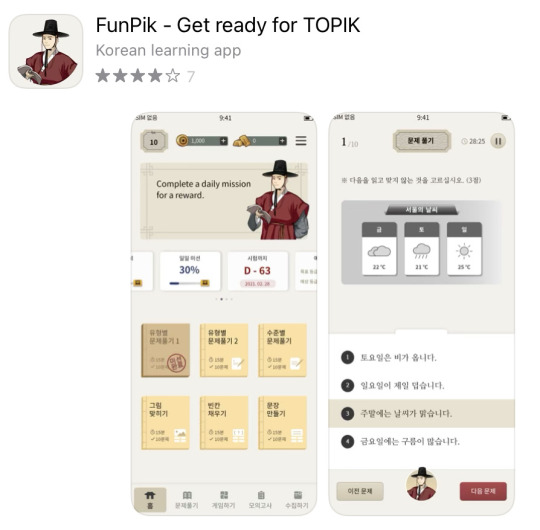
This is a really good app for TOPIK prep, or for people who just want a daily study app! It’s called FunPik and is free on both iOS & android!
PROS:
Mock tests (reading section only) for both TOPIK I & II with a built-in timer
Daily challenges; perfect if you just want to do a few minutes of studying without wasting time deciding what & how to study
3 different games: identify a photo, choose the missing word in a sentence, and unscramble a sentence (honestly the timer on these can make it pretty difficult, but it's a good goal to work towards)
Explanations!!! When you check which questions you got wrong, there's a short explanation about why the correct answer is correct (seriously, why doesn't every TOPIK app have this?)
The youtube channel...okay, technically not part of the app itself, but it links to the 펀픽 channel where you can watch short lectures about how to answer different questions and other study tips. The focused lectures are a more recent addition, so I hope they'll be adding more videos in the future~
Analysis of your progress, including how well you do on different types of questions, an estimation of how close you are to your target level, and how you spend your time in the app
Gameification for motivation~ Get those coins and study streaks! The coins are used to buy "historical relics" which gives you a random photo & description of various landmarks and things around Korea. Adds a little bit of history & culture learning!
CONS
I wish it had a friends list to add to the game aspect and be more competitive/supportive. You can see a ranking list of all users, but I don't care about random strangers lol
The sentence games are too hard for me (not enough time to think, need to be able to immediately answer if you want to finish/do well) and there's no way to adjust the level or turn off the timer. I don't know if the game levels change if you set your target TOPIK level lower
No listening section ㅠㅠ
No writing, but that’s kinda understandable since it'd need a person to score your writing
Overall, I highly recommend checking it out! If you're preparing for the TOPIK and need the extra nudge to study a bit more every day, this app would be perfect. And even if you aren't planning to take the exam anytime soon, this would be a quick & easy way to study during your commute or before bed!
114 notes
·
View notes
Text
어제 토픽 II 쳤는데 듣기 부분이...어려웠다 ㅠㅠ
그래도 시험이 다 끝나서 이제 중압감을 벗다
I took the TOPIK II exam yesterday, I'm so relieved I'm finally done with it. I'll get the results at the end of November !
2 notes
·
View notes
Text
📚Libri di Testo preparatori all'esame di coreano 🇰🇷 TOPIK 📌*::::::: La Certificazione Linguistica che attesta il proprio livello di competenza nella Lingua Coreana! ✍️■ ↪
NEW PRODUCTS HERE
Topik Simulation Test Books are the best sources to help you tackle all the 4 sections •📝 of the Topik 2 in order to pass ✅ it with a high score! 💯 ** Develop both Topik1 test-taking skills and korean language proficiency •They provide model answers for each type of questions and the needed strategies to practice with ** ➤ New Arrivals 📝 and Popular Language Books in stock ! 🔍• korean books Suitable ➡️for all Levels (1-6) of Korean.
#korean topik#topik1#topik2#study korean#korean books#learn korean#certificazioni#lingue#lingue orientali#south corea#corea del sud#studying korean#libri#토픽#language books#한국어능력시험#korean textbook
3 notes
·
View notes
Text
That’s a bit.. 아.. 애매하네
Learning a language can be difficult. There’s not always a direction translation of each word, and can sometimes be a bit ambiguous. One term that has always left me a little confused was 애매하다. You can hear it in just about any conversation: at work, in a game, about fruits, or even how someone’s feeling. So let’s try to define… ambiguity.
애매하다 – Vague, Ambiguous, Iffy
So it’s neither here or there, this or that. Personally it’s whenever I’d go.. ehhh..? Makes sense right? Let’s put it to use.
A: “아보카도가 뭔지 설명해주세요” A: “Describe an avocado please.” B: “애매한데.. 과일 같기도 하고 야채 같기도 하고.. 뭔가.. 맛은 야채 스프에 제일 가까운가? B: “Ehh, it’s sort of like a fruit and a vegetable.. It kind of.. it tastes closest to vegetable soup?”
A: “야, 너 쟤 좋아하지, 사귈 거야?” A: “You like him don’t you, are you gonna date him?” B: “아니, 그게.. 좀.. 잘 모르겠어” B: “No, it’s.. I don’t know” A: “애매하게 대답하지 말고” A: “Stop answering vaguely”
You can also hear it naturally in Talk to Me in Korean’s “IYAGI” Dessert Episode (~2:35 on Spotify or their website)
A: “디저트랑 간식이 경계 뭔가요?” A: “What’s the line between a dessert and a snack” B: “디저트는 아무래도 밥을 먹고, 식사를 하고 약간 바로 먹어야 디저트 아닐까요?” B: “For dessert you have to eat dinner. Isn’t dessert what you eat right after eating meal?” A: “아, 그 시간의 경게가.. 애매하네요” A: “Ah, the boundary is time, it’s a bit iffy.”
Hopefully that clears it up a little bit. Though it may be a tough term to master, it will help you sound a lot more natural. If you have any questions or suggestions please feel free to comment or message me! I know I’ve been a bit quiet on all fronts lately, but I’m diving right back into it! Stay tuned, and make sure to follow as my schedule can be a bit.. erratic (sorry!! ㅠㅠ)
#korean#korea#learning korean#vocab#grammar#learning#vocabularly#topik#한국어#한국어배우기#한국어능력시험#kimchibear#studyblr#study#learn
96 notes
·
View notes
Text
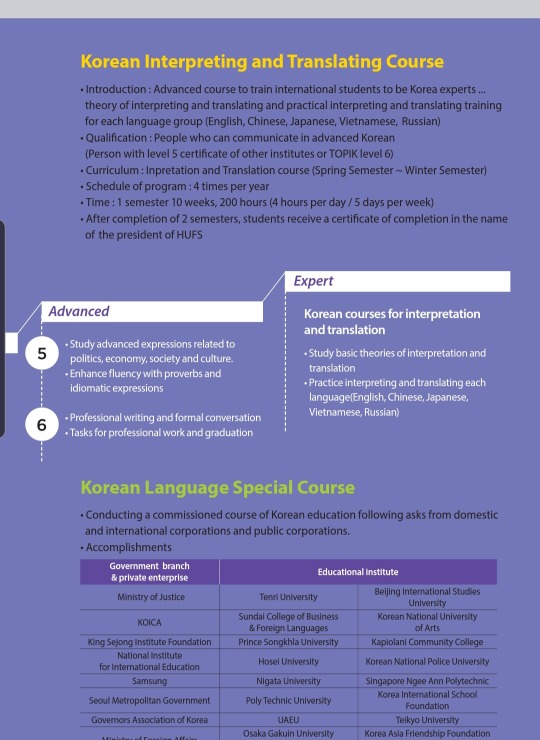
Sometime ago I found that Hankuk University of Foreign Studies' Korean Language Program had this course. It's only 6 months long, but it wasn't until a few days ago that I saw their new leaflet.
I think it could be good for someone interested in translating/interpreting that needs practice before an Interpreting/ translation school entrance exam. Or to get some idea of what are they are getting into.
I contacted the program a few months before and it seemed like a lot of people ouside of the Chinese and Japanese didn't know about the program so I decided to share it here.
9 notes
·
View notes
Text
Quelques mots commençant par 개 ~
개발 [開發] exploitation, mise en valeur, aménagement, développement, enrichissement, évolution 개선하다 [改善하다] améliorer, perfectionner, réformer 개성 [個性] individualité, personnalité, caractéristique 개인 [個人] individu, chacun(e) 개인기 [個人技] technique personnelle, talent individuel 개척자 [開拓者] défricheur(se), pionnier(ère) 개최 [開催] organisation 객관적 [客觀的] objectif 객실 [客室] chambre d’ami, cabine (d’un navire), compartiment (d’un train) 갱신하다 [更新하다] rénover, réparer, restaurer, transformer, renouveler, reconduire, mettre à jour, corriger
#vocabulaire#listevocab#vocabulaire coréen#vocabulary#korean studyblr#korean langblr#langblr coréen#coréen#studyblr coréen#한국어 공부하기#한국어공부중#한국어공부#한국어를#한국어 연습#한국어능력시험#한국어#한국연구#한국학#한국어배우기#한국 연구#한국어 어휘#어휘
2 notes
·
View notes
Text
Language learning (Korean)
I have been in Korea for 6 months. I was attending a Korean language institute under a scholarship programme and attempted the TOPIK exam for the very first time in January (68th TOPIK exam). In this post, I will list some books which I’ve found helpful and some methods that worked well for me throughout my time learning the Korean language. However, this post is really intended for recording the exam prep process before TOPIK.
According to many Korean language teachers and other students who have done the TOPIK exam before, the January exam - which only takes place within South Korea - is the easiest exam. I have no idea how that works and I am not sure how true that is. I’ve done past year papers too and it didn’t feel significantly easier to me but I suppose that is just a personal thing. I lacked the self-confidence and was pretty sure I’d only score a level 3 or 4.
To my surprise, I actually scored a level 6 albeit I only made past the mark by 3 points. I am not writing this so that I can brag about it because I do not think that I am at a native speaker level and mind you, the level 6 benchmark states that a level 6 fluency does not equate to native speaker level. I am writing this post simply to keep an actual record and share this (in case it is helpful to anyone studying the language - any language).
Plenty of people say that I have an advantage for being fluent in both Mandarin and English. I must say that it helps because there are many loanwords in the Korean language which are basically English written in hangul. Simple example: 아이디어 = idea. The Korean language also has its foundations rooted in Hanja (or Hanzi) which is the Chinese character. I would not say it is exactly the same as modern Chinese language has changed drastically but it does help to know Hanja to some extent. I do not think it will severely impede your Korean language learning process even if you do not know Hanja well.
Due to some personal reasons, I could not fully focus on exam preparations until the final 1-2 weeks right before the exam. I’ve found several books to be extremely helpful, which I will list below (with its book cover). And I will also mention methods that worked for me.
Before coming to Korea, I’ve never attended any classes or tutoring sessions. My entire experience of learning the language consisted of self-taught processes that included a lot of TV-watching and some consistent grammar workbook practices that helped lay down the groundwork. I must warn you that I struggled a lot with many fundamental grammatical mistakes that the teachers frowned upon because I made those mistakes unknowingly and no one was there to correct me before they solidified.
1. QUICK FIX FOR COMMON GRAMMAR MISTAKES

As mentioned, fundamental grammatical mistakes can severely impact your exam as it might make an impression that your understanding of the Korean language is weak. At least that was the opinion. I had about 2 weeks to fix that and this book helped tremendously. Would have been better if I had actually attempted to find this book earlier before. It’s a copy worth keeping as it has very intricate explanations that helps distinguish the grammatical forms that you might find confusing. You do not necessarily have to work through the book in chronological order. I certainly did not have the luxury of time to do that. I would like to believe that I managed to fix some serious flaws I had made far too often.
And I must admit that I did not even know certain differences between present and past tenses because they sound exactly the same to my ears. As I’ve mentioned briefly, I learned mostly by watching TV. (I’m really talking about those 은/는). It was a real mess, my basics. If you need an emergency quick fix for the same problem, you will need this.
2. TOPIK WRITING (#53 AND #54)
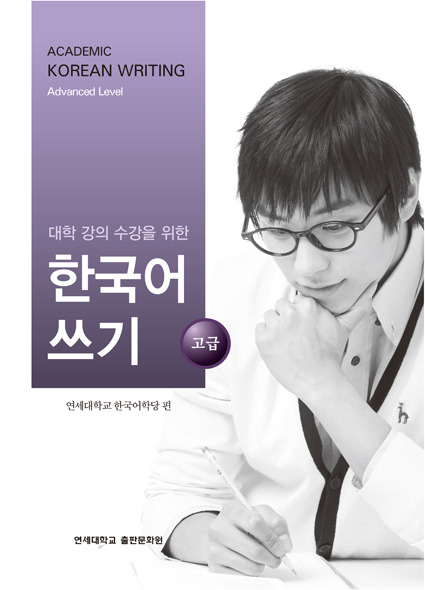
TOPIK writing is perhaps one of the most daunting section in the entire exam. Needless to say, practice is essential to improving writing skills in any language. Most TOPIK books are slightly lacking in this sense, at least to my personal preference. They have lists of terms that are useful for vocabulary building that would be useful for the reading and listening section but it might not be sufficient for the writing section where commonly used phrases might be more useful.
(*this is really a personal opinion because I did not like any of the word lists in several TOPIK books I’ve looked at. However, it doesn’t mean I’ve actually worked through several copies of TOPIK books before the exam. It might be just equally useful and what I did might have just been overkill.)
This book, apparently, is designed to help non-Korean speakers improve their writing skills in university settings, i.e. writing reports or essays as a university student in a Korean university. Coincidentally, the chapters are neatly divided into several topics/formats that will be useful for TOPIK prep. E.g. describing a graph or a set of data, etc. This is mainly for question 53. As for question 54, the possible selection of subject for a 700-word essay is vast. It can range from very subjective questions like what a person (or people in general) thinks of happiness to how does regret impact a person, etc. The purpose of this essay is not to hear your personal opinion although it would still be your opinion. What you are expected is to map out a general essay in relation to the subject matter and you must do so logically. Rather than, “I personally think that I would...” it is more of an essay stating “The purpose of A is XYZ. However, it can also be 123.” You can probably discuss alternatives and several concepts but your very own opinion can only be reserved as a small portion of the essay. You may choose to include it by tucking it somewhere in the conclusion of your essay. Again, I take no credit for this tip. I’ve heard this from various sources although none is verified as proven. It did work for me, I suppose.
3. WATCH TV WITH PURPOSE
This method makes up the bulk of my Korean language learning process. However, I did not just watch TV without putting in a little effort at times. I do not have a pen and paper with me every single time I watch TV but I do it from time to time. I’ve begun doing this since approximately 5-7 years ago where I take out a notebook and jot down terms or phrases I hear while watching TV and then look them up in the dictionary. I did this while preparing for the exam too specifically by watching the news or talk shows on economic/social issues. Those that discuss policies and politics will help too. I haven’t necessarily seen the questions to be impossibly difficult to the point where you’re expected to know highly specific terms although I would say confidently that knowing those terms could score you some points.
It sounds nerdy and might even sound like a chore to some but it definitely helps when learning words from textbooks or word lists are out of context and far more tedious. This method applies in watching almost all genres of dramas, variety shows and talk shows + news programmes. I wouldn’t say that I’d remember every word I’ve written down somewhere in my notebook but it’s a far more active method.
This method is called “immersion” (click on this link for a more detailed explanation) and here, I’m specifically laying down a detailed method of how I made it work for me and how it has helped me. The same works for songs by looking at the lyrics (in Korean) and picking up terms, words or phrases. It is always best to look up in the dictionary because you do not want to make common mistakes or write down slangs in your exams. There are also certain common mistakes Koreans make and it may be common enough to be understandable by all Koreans however, you might still lose some marks for not learning the language in its proper form. One major downside to this method is most certainly the main aspect in Korean language where there can be major differences between the written (문어) and oral form (구어). Certain types of grammars are specifically used in oral forms and would be an indication of your lack of formal learning. Thus, here I must say, this method cannot be relied on entirely. It should be complimented with some process of formal learning through books and perhaps online lectures. Or even make a simple search of the grammar form in question.
4. ESSENTIAL RESOURCES FROM VERY LEGIT SOURCES
The National Institute for Korean Language has a very holistic website which students of Korean language education and Korean language teachers use very often. I took this tip from them.
국립국어원 - where it has almost everything. This is the main site.
And more specifically,
한국어교수학습샘터 where you will have sections on grammar, common expressions, conjugation, etc.
Although these are all in Korean, they are useful to a great extent and especially for higher level learners. There are also many instances where higher level learners become confused with basic level grammar. These are resources that will be valuable for fixing those problems too (as it was for me). For a rogue learner like me, you might face similar problems (or not) and these were all various methods I’ve found useful for learning and fixing repeated mistakes.
________________________________________________________
I hope this helps. I’m not sure if it’s significantly different from other language learners but these are things that worked for me. I’ve always wanted to make a written record of my learning methods and this is it. At the same time, I hope it will prove useful to someone who might be preparing for the exam.
2 notes
·
View notes
Text

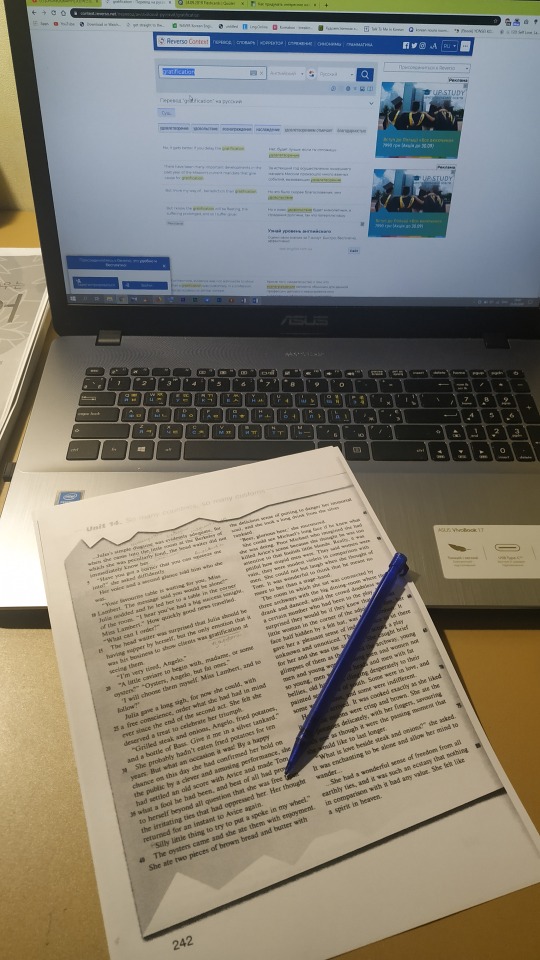

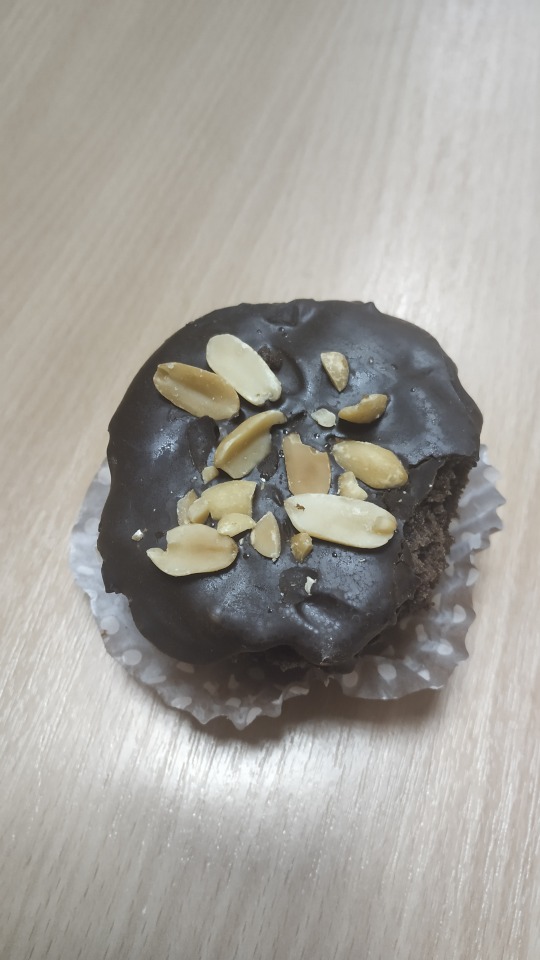
What happened with me?
Hi guys, sorry I didn't post anything here for about 3 or 4 days, but I was really productive (spent only 4 hours for sleeping) , my homework was crazy really!! And I didn't have time to check my Tumblr, because I only wanted to sleep after studying. Anyway I want to continue, and I found that my favorite blog is going to do the same 100 days of productive challenge, so I want to join and start again. But I will try to post here every day!! Some photos here^
#hw100days
#aesthetic#motivation#studyblr#books and libraries#education#motivational quotes#home & lifestyle#language#inspirational quotes#diy#studearrings#student#motivating quotes#study motivation#motivasyon#english#korean#한국어배우기#한국어능력시험#한국마사회#한국여행#한국어#kpop wallpaper#kpop music#kpop moodboard#booksofinstagram#booklover#book quotes#hw100days
6 notes
·
View notes